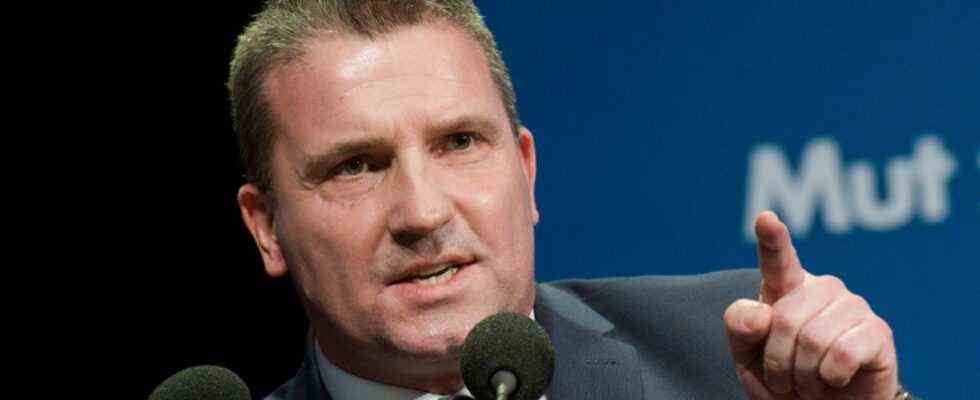Criticism from other parties
AfD man Martin Hess is to become head of the interior committee. Why this is so controversial
The AfD member of the Bundestag Martin Hess
© Stefan Puchner / DPA
The AfD has nominated its MP Martin Hess as chairman of the Bundestag interior committee. The committee also deals with the issue of migration. The personality is now met with heavy criticism from the other groups.
If the AfD has its way, its member of the Bundestag Martin Hess is to become head of the Bundestag interior committee in the future. Against the nomination of the 50-year-old police officer from Baden-Württemberg on Tuesday, there was fierce resistance from the police union as well as from members of the CSU and the left. According to the will of the AfD, industrial engineer Jörg Schneider is also to become chairman of the health committee. The graduate engineer Dietmar Friedhoff is to take over the leadership of the committee for development cooperation. However, it is still unclear whether the AfD MPs mentioned can take over the posts that have been assigned to them.
The main criticism was that the traffic light parties had left the important internal committee to the AfD, which deals with internal security and migration, for example. There were also concerns that the AfD should take over the health committee in the corona pandemic. “I am aware of the great responsibility of the office and will exercise it fairly, objectively and non-partisan,” said Hess. He rejects any security concerns in the strictest form. He has 27 years of service experience and is the chief police superintendent. In the area of internal security, he is appropriately qualified.
Now it is official: These men and women will rule Germany in the future
17 images
Filling the chairman’s post is purely a matter of form – actually
Bundestag committees are like miniature parliament. They are staffed in the plenary session according to the balance of power and discuss the bills in their respective areas. They listen to experts and put the bills into a resolution that can then be passed by the plenary. The committee chairpersons prepare the meetings, convene them, lead them and usually maintain good contact with the authorities, while the home committee chairpersons, for example, with the security authorities.
The chairpersons of the committees are assigned according to a very specific mechanism: the largest parliamentary group can choose a committee first, then the second largest, the third largest and so on. This goes on over several rounds until the chairs of the committees are distributed. The largest opposition faction – now the CDU / CSU – traditionally holds the chairmanship of the budget committee. Before the AfD, the SPD, Greens and FDP were still on the train in the first round, although they elected other committees. This is how the AfD came to inside, health and development. Usually the chairmen are seated with it.
But now it will depend on how the other groups behave. On Tuesday it was heard that, contrary to the usual procedure, there could also be votes in the committees on the chairmanship. The other parties could theoretically prevent the AfD chairman.
The former head of the Bundestag Interior Committee, Wolfgang Bosbach (CDU), told the German Press Agency that the election of the committee chairmen is usually only a matter of form after the parliamentary groups have been nominated. “But since more and more MPs are now convinced that it was a mistake to entrust the AfD of all people with the committee, which is also responsible for protecting our constitution from its enemies, I can well imagine that its members are very careful will pay attention to whom the AfD proposes here. “
Other groups are skeptical to outraged
In the parliamentary groups there is considerable resistance to the election of AfD members. The Left announced on Tuesday that it would definitely vote against the AfD candidate in the vote in the Interior Committee on Wednesday. “I can only say one thing: the left will never support a candidate from the AfD for such an office,” said the left parliamentary group leader Amira Mohamed Ali.
SPD parliamentary group leader Rolf Mützenich put it more cautiously. He said his group would look “closely” at every candidate. He pointed out that the AfD was under surveillance in some federal states. Mützenich also pointed out that a committee could work without the election of a chairman. In this case the deputy chairmen would take over the management.
FDP parliamentary group leader Christian Dürr also showed considerable skepticism. “A committee chairman also presents parliament to the outside world, so it depends on personal and professional suitability,” said Dürr. There is no automatic mechanism that a candidate for a committee chairmanship is also elected by the committee members. Union franchise chief Ralph Brinkhaus (CDU) referred to the sensitive issues that are currently being dealt with in the interior committee. He lacks the imagination to imagine that this is led by an AfD representative. CSU regional group leader Alexander Dobrindt was “outraged”: The interior committee is central to questions of the rule of law. It is therefore not acceptable that the AfD lead this.
AfD parliamentary group leader Alice Weidel warned the other groups against failing their party’s candidates. The AfD sees this as “an attack” on democratic principles. “Our group has a right to democratic participation in the German Bundestag,” she said. In the event that the AfD candidates should not be elected in the committees, she said: “Then we will of course stand by our candidates. We will certainly not let the other parliamentary groups dictate which candidates we should put up here.” Hess has “a flawless biography”, said the party and parliamentary group leader Tino Chrupalla in the ZDF “Morgenmagazin”. He was police superintendent with 27 years of service for this country. He did not know what would speak against electing Hess as committee chairman.

